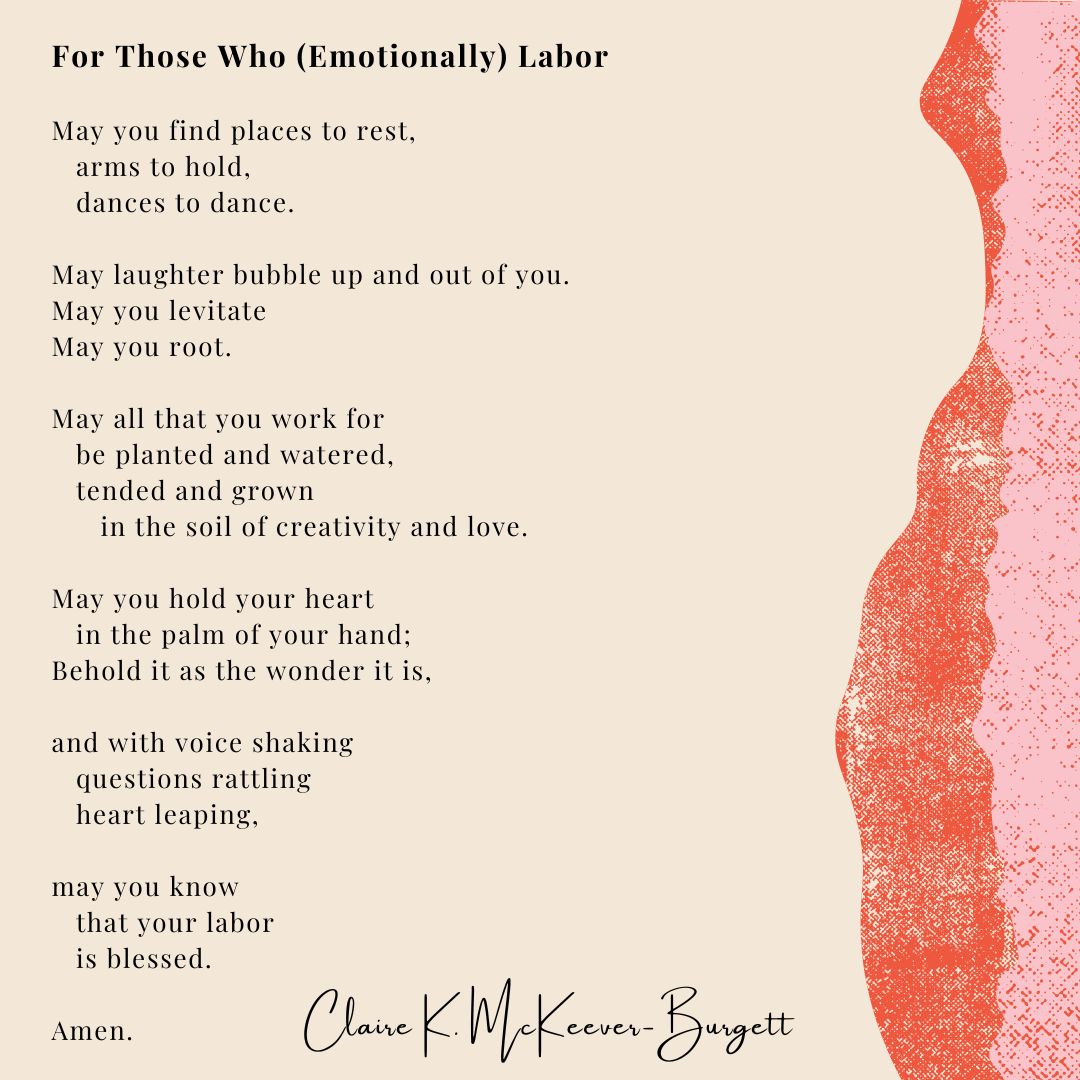For Those Who (Emotionally) Labor
If we're interested in following Jesus, we must follow the women. When we do, we'll find Jesus following them, too.
Dearly Beloveds,
I’ve been thinking a lot about emotional labor lately and how it isn’t whether my partner unloads the dishwasher or vacuums the bathroom or moves the clean laundry to the dryer. Those mundane, ordinary, and necessary household tasks are labor. Period.
But plumbing the emotional depths of one’s own heart, mind, body, and soul in order to be deeply acquainted with our own feelings so we can then show up to be compassionately present with someone else’s is what I’m talking about.
Take, for instance, the women showing up at the Tennessee State Capitol the past two weeks advocating for safer gun laws in our state. A video of one of the women advocating for gun safety went viral when she was forcibly removed from a subcommittee hearing for holding up a protest sign. Her voice shook. Her questions rattled. Her heart leapt from her chest. This is work that Black women have been doing in our state and country for years.
As I watched the coverage on my phone, I couldn’t help but wonder what the response would’ve been like if it’d been a group of white men holding signs advocating for their children’s safety. Where are the men, I wondered? Why aren’t they ripping their hearts out of their chests in protest of a system that continues to sacrifice our children on the altar of the almighty gun?
Further, if it had been a gaggle of white men instead of women, wouldn’t the response be different? Do we not still live in a world that values men’s voices and opinions over women’s? Sadly, infuriatingly, we see evidence of this time and time again.
Another enormous issue in our country is the lack of paid family leave, a problem that affects all of us but that is primarily still understood as a “women’s issue.” My husband, who works for Vanderbilt University, recently helped spearhead a proposal that culminated in Vanderbilt changing their paid family leave policy from a dismal 2 weeks (for both the birthing person and the supporting partner of a birthing person) to 8 weeks. He took this charge because of his experience with me giving birth to our two children and because he’s heard me say over and over again that he must use the privilege and power of the body he inhabits to help make positive, life-giving changes for the rest of us.
Like it or not, I’ve told him, someone who looks like you showing up in the halls of power advocating for better family leave lands differently than if it’s only people who look like me.
All of these thoughts on advocacy, gender dynamics, and emotional labor coincide with the approaching observance of Labor Day, made a national holiday by President Grover Cleveland in 1894 to celebrate the American worker.
What if this Labor Day, we included a celebration for all those who do the emotional labor our lives depend upon?
For the teacher who, instead of disciplining a kid for acting out, takes the time to sit next to them and be present.
For the parent who, instead of ignoring their child when they tell a story, pays such close attention to every little detail, they hear the plea for an emotional need for safety and love.
For the partner who, instead of turning out the light, says, tell me about your day.
For the person who keeps showing up to their weekly therapy sessions to plumb the depths of their emotions and tend to their own healing.
By and large, the women I know will keep doing the emotional labor required of us, not because we always love it, but because we know it’s vital to the sustenance of our lives and the lives to which we are bound. And I am convinced that we will only be able to sustain this beautiful, heart wrenching work if we are met by equal and whole parts creativity and courage from the men in our lives.
One of the chapters in my upcoming book, Blessed are the Women, names and shares a story about Jesus’ sisters. They are only mentioned once in all four Synoptic Gospels, in Matthew 13:53-56, and, of course, are not named. However, from my spiritual imagination, I have named them–Edith, Rachel, Sarah, and Leah–and crafted a story that shows how, as they regularly tend to their spiritual and emotional lives, they lead Jesus to do the same.
Jesus’ ability to weep (John 11:35), his ability to demonstrate love and compassion for his friends (John 13:23), his ability to show anger and exasperation (Matthew 21:12-13), and his ability to experience joy in community (John 2:1-11) is, I imagine, due in large part to the time he spends with his sisters and his mother.
If we're interested in following Jesus, we must follow the women. When we do, we'll find Jesus following them, too.
To be crystal clear, I don’t think all women engage in emotional labor all the time just as I don’t think all men do not. All or nothings can get us in trouble really fast just as gender binaries can (and often do). And so, in honor of Labor Day, in honor of the way of mothering and caregiving that is for all of us, I leave you with a prayer: “For Those Who (Emotionally) Labor.”
May we pray it. May we live it. And in so doing, may we continue loving ourselves, others, and the whole wide world.
See you back here next week, beloveds.
-Claire



